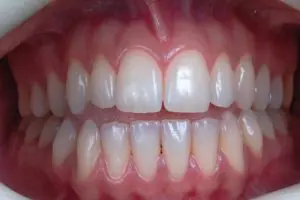We all want teeth that look pretty and a mouth free of aches, pains, and sensitivity. Our oral care is often the foundation for the rest of our health habits because when we take care of one part of our body, it becomes second nature to take care of our health as a whole.
Your enamel is a big deal when it comes to dental hygiene. As a leading family dentist in Weber County, we are passionate about educating the community about the importance of enamel care.
Tooth enamel is that thin outer coating of each tooth. It covers the crown of the tooth, the visible part outside the gums. Did you know enamel is transparent in color? But wait, what gives teeth the whiteish or yellowish color? That’s called dentin, the hard tissue beneath the enamel.
Tooth enamel is very tough. Fun fact: enamel is the hardest tissue in the body. Yes, even tougher than bone! Enamel has to be hard, as it is our teeth’s first defense against the many chemicals we’re exposed to through food and drinks. However, if we don’t take the proper steps to take care of our enamel, it can be subject to severe wear and tear, also known as enamel erosion.
Enamel erosion can lead to unsightly tooth stains and extreme sensitivity. The tooth enamel you start with is the only one you’ve got. It’s not like a lizard’s tail that keeps growing back. Once it’s damaged, it’s damaged. You can prevent dental erosion in the first place and help prevent minor or moderate decay from getting worse through dental treatment and daily tooth care.

(Ozkan Guner/Unsplash)
The Effects of Tooth Erosion
Each case of dental erosion can look different. But symptoms typically include:
- Mild, moderate, or severe sensitivity to tastes, textures, and temperature
- Chips or cracks in the teeth
- Discoloration
- Cups on the surface of your teeth (indentations)
Your enamel erosion may be severe if you:
- Experience pain
- Feel extreme sensitivity when consuming hot, cold, acidic, or spicy food/drinks
- Notice unsightly tooth discoloration
If left untreated, enamel erosion can lead to complications such as:
- Yellow teeth
- Severely sensitive teeth
- Rough and painful edges on your teeth
- Shiny specks on your teeth
- Noticeable tooth decay
- Translucent teeth
- Fractured teeth
What Causes Enamel Erosion?
With all the dyes and acidic substances found in our food and beverages, it’s safe to say eating habits, coupled with poor dental care, are responsible for a high percentage of dental erosion in the U.S. When saliva does its job; it works to neutralize the acid in your mouth to protect your teeth. If you get too relaxed about caring for your teeth and consume high amounts of acidic food and drinks, your enamel may be in trouble and start to erode over time.
Foods that Contribute Most to Enamel Erosion:
- Any extra sugary foods such as syrups, ice cream, and caramel sauces
- Extra starchy foods such as white bread
- Super acidic food like apples, citrus fruits, rhubarb, and powdered fruit drinks
- Fruit juices and drinks
- Soda (citric acid, phosphoric acid, and sugar are a triple threat to your teeth)
In addition to foods and drinks negatively affecting your enamel, certain habits may cause faster wear and tear of the enamel, including:
- Acid reflux
- Teeth grinding
- Xerostomia (low salivary flow) common in those with diabetes
- Daily use of certain medications, especially antihistamines, and aspirin
- Eating disorders like bulimia disrupt the digestive processes and bring stomach acid up into the mouth
- Specific genetic diseases that disrupt tooth development, such as amelogenesis imperfecta or hypoplasia
Preventing and Treating Tooth Erosion
If you know a trusted and experienced dentist, they can help treat your enamel erosion. The severity of your decay will determine the treatment technique.
Tooth Bonding
Bonding is a simple procedure where your dentist applies a tooth-colored material called resin to your stained or damaged teeth. The resin is custom-made to match your teeth and cover up any unsightly stains. It also helps to protect your damaged teeth.
Crown or Veneer
In more severe cases, applying a crown or veneer can help to prevent additional decay and damage.
The best-case scenario is to prevent enamel erosion altogether. Make brushing, flossing, and rinsing your mouth after consuming acidic food/drinks a daily habit, and you shouldn’t have to worry about erosion. Try to keep your sugar and acidic consumption in moderation, and don’t stop showing up to your dental cleanings every six months.
Taking care of your teeth means a prettier appearance and a cleaner, more comfortable mouth. Don’t become lazy when it comes to your oral care. Be diligent about caring for those beautiful pearly whites, and thank yourself later. If you don’t already have an experienced Weber County dentist, contact us to schedule your first appointment.
